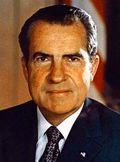It's true for us, and it's true for political philosophies as well. They have sell-by dates. They expire. Often explosively.
That's the real lesson of today's Republican Party. As Markos Moulitsas notes it's strange for Netroots Democrats to be watching the edifice of the once-almighty conservative movement collapse like Sauron's eye at the end of Lord of the Rings.
But I am old enough to have seen this before. Welcome to the 1969 Game.
 The 1968 election had been wicked close, so Democrats at that time had no sense they had lost the mandate of heaven, that their New Deal politics was as dead as Herbert Hoover, on whose political grave they had danced for a generation.
The 1968 election had been wicked close, so Democrats at that time had no sense they had lost the mandate of heaven, that their New Deal politics was as dead as Herbert Hoover, on whose political grave they had danced for a generation.Their inclination was much like that of today's Republicans. In response to their electoral defeat most Democrats decided the answer was to become more like themselves. George McGovern.
The views of that era's Democrats were far, far to the left of anything which might be considered politically acceptable today. They rejected the Cold War in mid-stream, not just the Vietnam War but the entire premise. They supported truly progressive tax rates across-the-board, not just on the federal level but on the state and local level. They wanted to resume the War on Poverty and wars against every form of injustice known to man or woman, just as most Americans had grown exhausted by the effort.
 It may seem impossible now, with the story of his fall so oft-told, to see the promise Americans saw in Richard Nixon. For suburbanites he represented safety, for the greatest generation values. He represented suits and dresses, old-fashioned religion, everything those brought up in the 1930s thought was at risk in the tumult of the 1960s.
It may seem impossible now, with the story of his fall so oft-told, to see the promise Americans saw in Richard Nixon. For suburbanites he represented safety, for the greatest generation values. He represented suits and dresses, old-fashioned religion, everything those brought up in the 1930s thought was at risk in the tumult of the 1960s. What's important to remember is that Nixon gave his followers hard-right rhetoric but policies of modest change. Franklin Roosevelt had done much the same in 1933 — the cost of his programs against the Depression was not big enough to do the job. William McKinley felt like continuity in 1896, even though he launched what became both the Progressive Era and America's Imperialist expansion.
This always happens. The disappointment felt by Democrats toward President Obama is both understandable and natural. Washington remains under the nominal control of the dying Thesis. Everyone who lives there thinks Nixon-era politics still demand our respect, even if the President seems to be leaning against those assumptions. Just as a generation ago Nixon was resented by the media of his time.
It's important we remember all this so that, in the next months and years, we don't go where Nixon went, which is off the deep end. Nixon's paranoia delayed the onset of the Thesis which carries his name by a full decade, a case of Carterus Interruptus. Also as a result, Democrats did not really begin leaning against the new Nixon Thesis until after the 1984 election.
 It's also important to note the other great historical lesson. Nixon is as dead as FDR, as dead as McKinley, as dead as Abraham Lincoln or Andrew Jackson. That era is well and truly over, despite what Joe the Plumber may think, despite what David Broder may think. It's over. Khattam Shud.
It's also important to note the other great historical lesson. Nixon is as dead as FDR, as dead as McKinley, as dead as Abraham Lincoln or Andrew Jackson. That era is well and truly over, despite what Joe the Plumber may think, despite what David Broder may think. It's over. Khattam Shud. All you're seeing, in the teabagging and the thumping of chests by Rush Limbaugh and others, is a dead star gone nova. It will shine brightly for a time, but it will fade quickly and leave a black hole where Nixon, and Reagan, and the Bushes once reigned.











